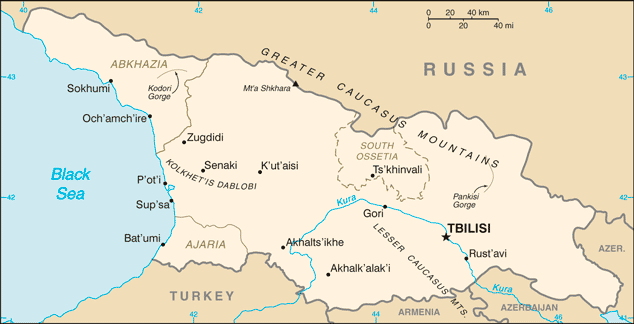
Georgia’s ruling coalition March 9 agreed to withdraw a controversial “foreign agent” bill after days of angry protests in the capital Tbilisi. The bill “On Transparency of Foreign Influence,” introduced in Parliament in February, would have required non-governmental organizations and media outlets that receive 20% or more of their annual revenue from a “foreign power” to register as “agents of foreign influence” with the Justice Ministry.
The “Russia inspired” bill drew swift condemnation from Georgian President Salome Zourabichvilli, who has grown increasingly alienated from the ruling coalition. It was also condemned in a statement by the EU. Officials said the bill would have a “chilling effect” on Georgia’s EU member candidacy ambitions. The EU urged Georgia to uphold its commitments to “democracy, the rule of law and human rights.”
Opponents are still demanding that the bill be formally withdrawn. The controversy has exposed growing political rifts in Georgia. Despite Georgia’s aspiration to EU membership, Russia still exerts strong influence over the country. Two northern regions, Abkhazia and South Ossetia, comprising almost 20% of Georgia’s total land area, have been occupied by Russian military forces since 2008.
From Jurist, March 9. Used with permission.
Map: PLC





EU condemns Georgia admin for reintroducing foreign-agent law
The EU condemned April 4 Georgia’s ruling party, Georgian Dream, for reintroducing a controversial foreign-agents law. If the law is adopted, civil organizations that receive over 20% of their funding from abroad must register as “agents of foreign influence.” (Jurist)
Protests as foreign agent law advances in Georgia’s parliament
Police beat protesters outside Georgia’s parliament building April 17 following the body’s approval of the first reading of a Russian-style foreign agent draft law. (PRI, NBC)
Georgia parliament cancels session amid mass protests
The Parliament of Georgia cancelled its plenary session on May 2 amid widespread protests over the controversial “foreign agents” bill. Lawmakers stated that the cancellation was due to damage caused to the parliament building as a result of the protests. (Jurist)
Georgia lawmakers pass controversial ‘foreign agent’ bill
Georgia’s parliament on May 14 adopted a controversial law designating civil society organizations that receive funding from abroad as “foreign agents.” The law stipulates that civil society organizations receiving more than 20 percent of their funding from international donors must formally register as “foreign agents.”
Ahead of the law’s passage, Georgian Prime Minister Irakli Kobakhidze voiced defiance of the widespread protests against the measure:
(Jurist)
Georgia president vetoes ‘foreign agents’ law
President of Georgia Salome Zourabichvili on May 17 vetoed the controversial “foreign agents” law that has been decried as “Russian-style” legislation and has sparked massive protests in the country. (Jurist)
Georgia: thousands rally against ‘foreign agent’ law
Thousands of Georgians rallied in the capital Tbilisi to commemorate the country’s Independence Day and protest the controversial “foreign agents” law. Georgia’s ruling party in parliament said it intends to override a presidential veto over the law. (Jurist)
Georgia parliament overrides veto of ‘foreign agents’ bill
The parliamentary bloc of the ruling Georgian Dream party overrode a veto from President Salome Zourabichvili May 28 allowing controversial “foreign influence” legislation to become law.
The parliament overwhelmingly voted in favor of overriding Zourabichvili’s veto, giving the president five days to sign the bill or leave it to the speaker of parliament to do so. (Jurist)
Georgia: ‘foreign agent’ law hinders EU membership
The EU has warned that Georgia’s new “foreign agent” law has put Georgia’s bid for EU membership into jeopardy. The European Council specified that the new law “represents backsliding” on Georgia’s path to EU membership. At present, the EU announced that the new law has led to “a halt of the accession process.” (Jurist)
Post-election tensions in Georgia
Georgia’s President Salome Zurabishvili and opposition parties have questioned the results of the country’s parliamentary election on Oct. 26. The pro-Russia party Georgia Dream party, led by oligarch Bidzina Ivanishvili, was declared as the winner, but opponents are calling the election illegitimate amid criticism from international observers and allegationsof violence, voter intimidation, breach of vote secrecy, and obstruction of observers. (Jurist)
Earlier this month President Salome Zourabichvili refused to sign a highly controversial “Family Values and the Protection of Minors” bill backed by Georgia Dream, which would significantly curtail the rights of LGBTQ+ individuals. (Jurist)